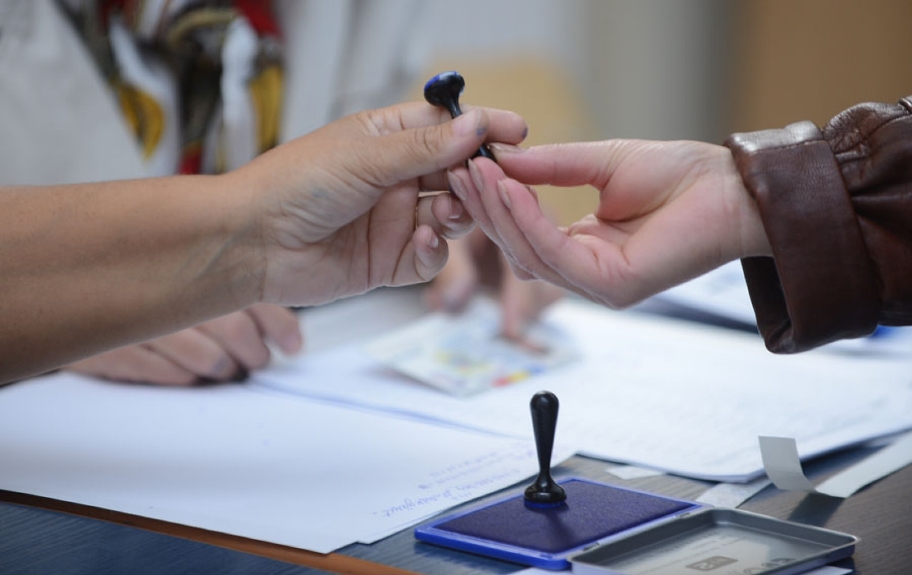
The West-leaning candidate lost the presidential election despite overwhelming support from expatriate voters, raising many questions. Maia Sandu’s most fervent supporters gave their all to get her elected president of Moldova. They petitioned the authorities. They ran a hugely successful get-out-the-vote drive. And when the electorate voted for Sandu’s opponent they launched a slew of court cases, trying to reverse the outcome.
This year’s Moldovan presidential election gave citizens the right to elect the head of state by direct vote for the first time since 2000. After the first round of voting on 30 October narrowed the field down to two, voters were presented with a stark choice. One candidate pledged to improve ties with Russia, ending years of cozying up to the European Union; his opponent’s mantra was closer European integration as the only way out of the country’s spiraling economic and demographic collapse.
In the runoff on 13 November, Socialist Party leader Igor Dodon won by a relatively small margin – a swing of fewer than 70,000 votes would have delivered victory to Sandu (pictured), the pro-EU candidate. Foreign-based Moldovans overwhelmingly backed Sandu, a former education minister. In the two weeks between rounds, Sandu’s expatriate supporters came together in a remarkable show of solidarity, in the end delivering 86 percent of the foreign vote to the candidate who herself worked abroad as a World Bank official. Yet only a fraction of the diaspora cast ballots, leaving many wondering if they could have turned the tide had the authorities heeded their calls for more polling stations and more ballots.
As the country waited for the Constitutional Court’s decision on whether to validate Dodon’s victory, the contest shifted to courtrooms where Sandu and her backers filed a number of lawsuits, accusing the authorities of discriminating against the diaspora and her opponents of using their political weight to influence the campaign.
Breaking the Silence
Moldova has one of the highest migration rates in Europe. Over the last 20 years, the exodus of working-age Moldovans has been the major factor in a 25 percent decline in the homeland population. The majority are long-term migrants; around half are believed to be living in Russia, with many of the rest based in the EU, primarily Italy, France, and Portugal.
Moldovans living abroad can only vote in person at the nearest polling station, forcing some to undertake long journeys. This year’s champion traveled 1,200 kilometers (750 miles) from his home in China to the Moldovan Embassy in Beijing.
“I feel obliged to take part in the election because this might be our last chance [to change the political system],” said Iurie, a Sandu supporter who studies international law in China.

“I want to start a family at home” instead of remaining in a foreign country, he added. The diaspora is huge – Moldovans residing abroad make up around a quarter of the country’s total population of just under 3 million – and indispensable to the homeland economy, but until this year had not showed much enthusiasm for voting.
In the first round, Dodon came just 3 percentage points short of being elected outright, a result that set off a flurry of activity among Sandu’s many EU-based expatriate supporters. Truck drivers and taxi drivers overseas offered to deliver fellow Moldovans to the nearest polling place at a cheap price. Others shared their cars and homes at no cost, through a Facebook group called Adopt a Vote, which soon swelled to 98,000 members, mostly Sandu backers like Iurie.
The candidates directed their pitches at very different audiences. Dodon (pictured) drew heavily on support from rural Orthodox believers and priests. He opposed LGBT equality and non-discrimination rights and pledged to “restore broad and friendly ties with Russia,” playing on widespread discontent with a series of pro-Western governments that failed to implement the EU’s demands for liberal reforms.
Sandu also took on the current government, vowing to be tough on the blatant corruption that tarnished many former top politicians, one of whom she helped bring down. In 2012 she was recruited from her prominent World Bank job to become education minister, and came close to being named prime minister in 2015, amid months of turmoil over a bank fraud scheme that implicated a prime minister and fueled speculation of oligarchical influence over the government. As public protests mounted, Dodon’s Socialist Party led many large rallies against government graft.
Moldovan labor migrants in the European Union, well aware of the benefits of visa liberalization, began wondering if a Dodon victory would endanger travel rights and the other planks of the 2014 EU Association Agreement, the most significant step so far on the way to full union membership.
Cristina Barreras, who with other Moldovans traveled 300 miles or more from their Florida homes to Atlanta, where the nearest polling place was located, shared her hopes on Adopt a Vote.
“We rented a bus and we are quite optimistic that we can change the Moldovan political system, to bring a better life to our parents, families, and friends who live there. They deserve a better future, a more transparent and competent president who will represent our interests,” she said.
Thousands Turned Away on Voting Day
These concerns, coupled with the low turnout in the first round, motivated many expatriates, even those who left the country long ago.

The effort was a huge success by most standards, as the foreign vote swelled in the second round, with the large majority casting ballots in the EU member states and other Western countries. Yet even with 86 percent of foreign-based voters backing Sandu, helping her narrow Dodon’s 10-point lead in the first round, the Socialist Party candidate was elected with 52.1 percent of the vote to Sandu’s 47.9 percent.
Some political analysts joined Sandu’s diaspora constituency in arguing that the results could have been different if the elections had been better organized, with more polling stations and more ballots for the diaspora. Even though 138,281 expatriates voted in the runoff – double the turnout in the first round – the figure indicates that only roughly a fourth of adult Moldovans living abroad voted.
No one disputes the importance of the diaspora to Moldova’s economy. Remittances from workers abroad amount to the equivalent of 20 percent of gross domestic product, the International Organization for Migration has said. Independent estimates of the diaspora population range from 700,000 to 1 million out of a total population of 2.9 million – including citizens abroad but excluding the quasi-independent Transdniester territory. Official figures for the expatriate population range from 329,000 in the last census, held in 2014, to 805,000 by the Foreign Ministry’s reckoning.
Yet, according to the UN Development Program’s recent online survey of the Moldovan diaspora’s voting patterns, only about 10 percent of expatriates participated in previous parliamentary elections. Calls for the authorities to encourage diaspora voting seemed to go unheard. The Central Electoral Commission (CEC) approved just five additional foreign polling stations for the presidential election, bringing the total to 100.
Organizational problems emerged during the first round in cities such as London and Paris, where a shortage of ballots forced polling places to close at 6 p.m. Responding to pleas for more ballots the CEC raised the ballot allotment for just 10 foreign polling places, leaving the rest with the original allotment of 2,000 ballots. In the runoff, 13 polling places ran out of ballot papers, leaving 10,000 people unable to vote, Sandu said.
People in Britain, Ireland, France, Germany, Italy, and Canada lined up for hours. In frustration, Sandu complained that as many as 200,000 people could have voted for her but for the CEC’s resistance to meeting the demand for more ballots and more places to vote, and called for the resignation of the CEC and officials of the governmental Office for Diaspora Relations.
In Parma, Italy, 500 people were waiting to vote when the ballots ran out, an hour before the voting station was scheduled to close. One voter, Alex Strambeanu, said on Adopt a Vote that those turned away were so disappointed they did not bother to sign a complaint petition addressed to the CEC. “If the authorities did not care about ensuring more ballots, why would they care about our petitions now? I have no guarantee that our voice will be heard,” he wrote.
Warning signs had already appeared before the elections. Lidia Plop, the leader of a Moldovan-Italian association, said the online registration system in her region was designed to accommodate no more than 1,700 applications.
Instead of opening one more voting station in this region, the electoral authorities refused to react to their needs. As a result, thousands of Moldovan citizens were turned away,” she wrote on her Facebook Page.

The complaints of expatriate voters were not well received by Dodon’s camp back in Moldova, where the general view is that those who left the country years ago are out of touch with Moldova’s economic and political challenges. “They have no right to show off as real patriots of Moldova, compared to those who decided to stay in the country and solve society’s problems. … It would have been better if they returned to our country to see the real challenges of our nation, and have respect for our choice,” said Olga Goncearova, a former head of the governmental Interethnic Relations Bureau.
The announcement of Dodon’s victory sent thousands into the streets of Chisinau and at least 30 foreign cities in protest. Members of the diaspora added their voices to the accusations of a rigged election and demands for a third ballot.
Sandu’s expatriate voters also demanded the resignation of the CEC, especially after its refusal to accept more than 4,000 complaints about the voting process collected by Sandu’s Action for Solidarity Party. The CEC president, Alina Russu, told the media that the Action for Solidarity Party had no legal right to represent the interests of these people.
Taking It to the Courts
Sandu supporters at home and abroad then scrambled for action in the legal arena. In late November a Chisinau city court began hearings in “Diaspora vs. Moldova,” a case in which 143 expatriate voters accused the government of discriminating against them. Two prominent lawyers, Eduard Digore and Veronica Mihailov-Muraru, representing the plaintiffs on a pro-bono basis, argued that the CEC’s decisions to set up only 100 polling stations with an initial allotment of 2,000 ballots each constituted a violation of the right to vote.
Hoping to achieve new elections by proving the process had been flawed, Sandu’s party brought nine cases, citing a slew of alleged irregularities: violation of foreign-based voters’ right to vote, involvement of the Orthodox Church in the election campaign, illegal voting, and defamatory statements about Sandu in the media. Finally, the lawsuits accused her opponents of organizing transport to bring Transdniestrians into Moldova proper to vote.
Sandu herself challenged the second round outcome at the Constitutional Court, the country’s highest legal arbiter. Saying it would take the legal actions into account, the Constitutional Court announced it would decide whether to validate the election by mid-December.

Questions also arose about the votes of Transdniester residents. Although the territory remains Moldovan under international law, Chisinau’s hand is powerless there, so no polling stations were set up, forcing anyone who wished to vote to travel into Moldova proper.
Noting allegations of Transdniestrians being paid to vote for Dodon in addition to the problems for EU-based voters, Anatolie Taranu, director of the Politicon think tank, said there was sufficient evidence to invalidate the election.
On the campaign trail Dodon had called for a federalized Moldovan state affording autonomy to both Russian-sponsored Transdniester and the mostly Russian-speaking Gagauzia region. (In Transdniester’s own election on 11 December, voters chose parliamentary leader Vadim Krasnoselsky to head the unrecognized state.)
Lawyer and former parliamentarian Alexandru Arseni also argued that the issues in Transdniester and among the diaspora gave sufficient grounds for the Constitutional Court to invalidate the election. He pointed to the experience in Austria, where a complaint about postal ballots by the losing candidate in May’s presidential elections led to a new election being called this month (in that case the candidate originally declared the winner, Alexander Van der Bellen, was confirmed by a significantly larger margin.)
By early December Sandu’s last defenses were crumbling
First, the Chisinau court found in favor of the government in “Diaspora vs. Moldova,” a decision that was confirmed on 12 December when the Supreme Court refused to hear the case on appeal. The judges said it was not within their competence to assess the effect of electoral irregularities, while in any case the number of complaints was too small to have changed the outcome of the election.
The nine cases filed by Action for Solidarity all reached the Supreme Court as well, but all foundered for the same reasons as “Diaspora.” By its rulings, the court deprived her and the party of effective legal means to stop election fraud, Sandu said.

On 13 December, the Constitutional Court declared Dodon’s election official. Yet in validating the election outcome and at the same time rejecting Sandu’s challenge, the court took note of the diaspora’s voting problems. After analyzing the CEC’s reports and the Supreme Court’s rulings in favor of the government, the Constitutional Court said the authorities ignored the complaints of 1,434 Moldovan citizens abroad who were unable to vote owing to lack of ballots, and 2,597 other expatriates who signed collective complaints filed with the CEC. However, taking into account the difference of 67,000 votes among the two candidates, the problems with diaspora voting could not have influenced the election results, the court added in its decision.
The justices echoed the Supreme Court ruling, arguing that substantiating alleged voting problems lay outside their jurisdiction. All the court could do was advise parliament to amend the electoral laws.
When the court’s president Alexandru Tanase said Sandu had to come up with more evidence of voting fraud, she replied that it was the duty of the CEC, law enforcement, and other official bodies to investigate the allegations and that it seemed Moldova had now become a state where no one can be held responsible for fraudulent elections.
Dodon will be sworn in before a joint session of parliament and the Constitutional Court on 23 December.





















